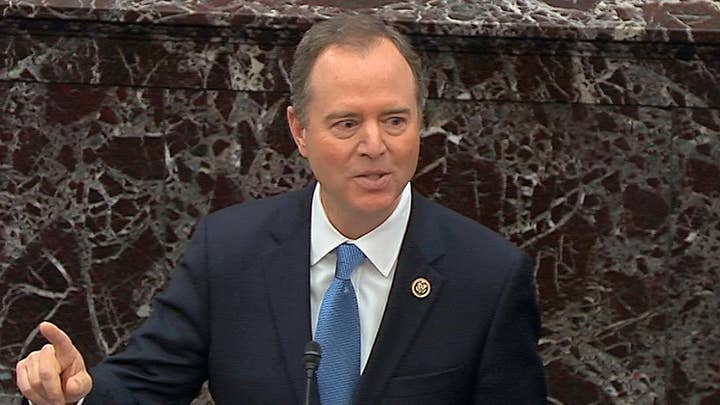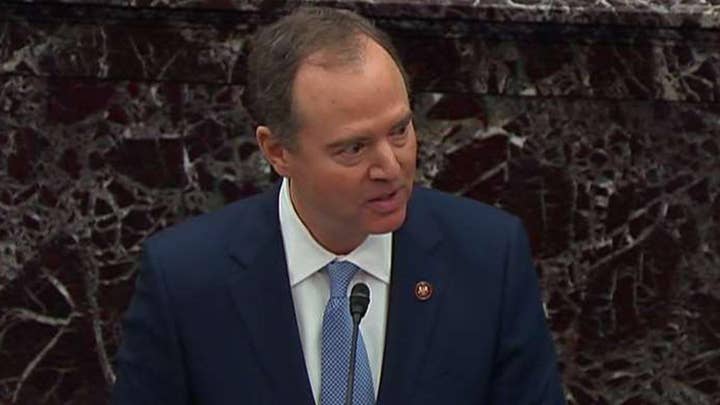Tucker: Adam Schiff practices his theatrics
Rep. Schiff rants about fighting Russia, prays for the soul of our nation.
Sen. Ted Cruz, R-Texas, has had enough of the impeachment trial by the time it got to the first dinner break in President Trump’s impeachment trial Tuesday night.
“God help us if we have to listen to [House Intelligence Committee Chairman] Adam Schiff, D-Calif., prattle on for 24 hours, non-stop,” lamented Cruz in the Senate subway terminal.
This is the balancing act for the Democrats. Schiff is the face of the Democrats’ impeachment effort. House Speaker Nancy Pelosi, D-Calif., handpicked Schiff to be the lead impeachment manager to present the House’s case to the Senate, leapfrogging House Judiciary Committee Chairman Jerry Nadler, D-N.Y.
Schiff impressed Pelosi when he led a Judiciary Committee task force on impeachments in 2009 and 2010. Schiff dealt with the House’s impeachments of Federal Judges Samuel Kent and Thomas Porteous. Pelosi admired how Schiff conducted himself.
Schiff is anathema to Republicans. They present him as the bogeyman of the impeachment inquiry. The chairman who held “secret hearings” down in the “bunker” and barred Republican members from attending the session.
There were no private hearings. More than 100 House members sat in on various depositions led by Schiff and other committee chairmen. And the Intelligence Committee is located in an underground, secure location of the Capitol because, well, it’s the Intelligence Committee. The House doesn’t exactly take depositions in the courtyard of the Rayburn House Office Building.
The public may well indeed judge that it’s heard too much of Schiff at the end of the Senate trial. He’s consumed hours of debate in the trial, holding forth, often extemporaneously. Democrats think Schiff’s the best weapon they have against Trump. But there is such a thing as overexposure. And Schiff is dominating hours of cable TV broadcasts these days.
Some of the president’s defense is not so much to defend Trump – but to undercut Schiff and the impeachment managers.
A key part of Trump’s defense won’t unfold in the well of the Senate chamber. That’s because the president added seven House Republicans to his defense team this week. They won’t hold speaking roles in the trial. These surrogates will appear on television instead. And many of them are going right for the jugular with Schiff.
“I don’t believe a thing he says,” said Rep. Debbie Lesko, R-Ariz., on Fox News.
“I think it’s a cover-up from the fact that Adam Schiff is a fact witness. Adam Schiff does not want the American public to know how much he and his committee knew about this whistleblower and the issues going forward,” said Rep. Doug Collins, R-Ga., the top Republican on the House Judiciary Committee.
Anyone who’s been around Congress for any period of time knows that lawmakers make most of the sausage late at night. The challenging stuff. The sticky stuff. Lengthy markup sessions which run after hours. Key votes. Coffee fueled weekend meetings to draft legislation or hone a press strategy.
So it should be no surprise that the most important, electric moments of Trump’s impeachment trial came at the witching hour early Wednesday morning: 12:01 a.m., to be precise.
Senate Minority Leader Chuck Schumer, D-N.Y., offered an amendment to the trial framework proposal offered by Senate Majority Leader Mitch McConnell, R-Ky. Schumer’s plan would issue a subpoena for former National Security Adviser John Bolton and authorize Senate Sergeant-at-Arms Michael Stenger to enforce the subpoena.
Nadler presented the case to summon Bolton. But Nadler lectured the Senate, arguing that the Senate was in fact “on trial” too, in addition to the president.
“History will judge, and so will the electorate,” steamed Nadler.
A few GOP senators grumbled under their breath as Nadler excoriated senators.
“Calling senators part of a cover-up, saying that a vote against (subpoenaing Bolton) was treachery and saying a vote against (Schumer’s amendment) was a vote against the United States. … I mean that’s an extraordinary thing to say on the floor in the middle of a trial,” said Sen. Josh Hawley, R-Mo.
A few minutes after Nadler concluded his post-midnight remarks, White House Counsel Pat Cipollone tore into the New York Democrat on the Senate floor.
“The only one who should be embarrassed, Mr. Nadler, is you for the way you’ve addressed this body,” excoriated Cipollone. “This is the United States Senate. You’re not in charge here.”
Cipollone wasn’t done.
“Mr. Nadler, you owe an apology to the president of the United States and his family. You owe an apology to the Senate. But most of all, you owe an apology to the American people,” seethed Cipollone.
It was a remarkable exchange. Not for just what was said. But the fact that it happened at all under the Dome of the U.S. Capitol.
Both the House and Senate have explicit rules about what members can say on the floor, and, in particular, about one another. They can’t cast aspersions. They can’t impugn the integrity of another member. They can’t assign motive. Such an exchange immediately would be ruled out of order on the floor or in a committee. The same if a witness said something just as inflammatory at a committee hearing. And, most judges usually would upbraid opposing counsels if they addressed one another in similar fashion or used ad hominem language in the courtroom.
But this is not a usual House or Senate session or a committee hearing. It’s not even a regular trial. It’s a presidential impeachment trial. And that’s why some suspected Chief Justice John Roberts wouldn’t flag the remarks.
But Roberts did.
“I think it is appropriate at this point for me to admonish both the House managers and the president’s counsel in equal terms to remember that they are addressing the world’s greatest deliberative body. One reason it has earned that title is because its members avoid speaking in a manner that using language that is not conducive to civil discourse,” admonished Roberts. “I do think those addressing the Senate should remember where they are.”
The Senate is full of precedents. And Roberts cited the impeachment trial of Federal Judge Charles Swayne in 1905. Senators debated whether it was appropriate to use the word “pettifogging” on the floor during the trial.
The word means to project underserved attention on minor details.
CLICK HERE TO GET THE FOX NEWS APP
Roberts told senators he would emphasize a standard of decorum so strict that they can’t use the “pettifog” in Trump’s trial.
And this brings us back to the case at hand. Republicans are assailing Schiff, Nadler and tactics of the Democratic managers.
Democrats think the president committed “high crimes and misdemeanors.”
And whether it’s allowed on the floor or not, Republicans think Democrats are just pettifogging Trump.















































